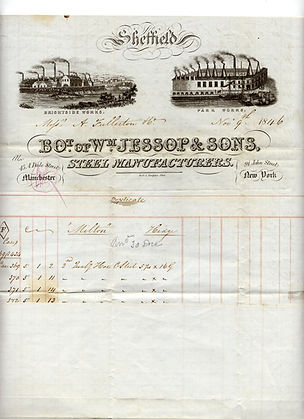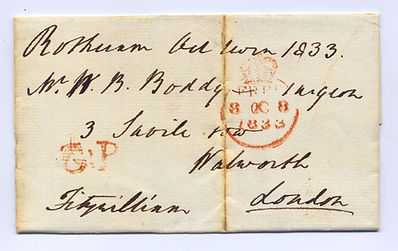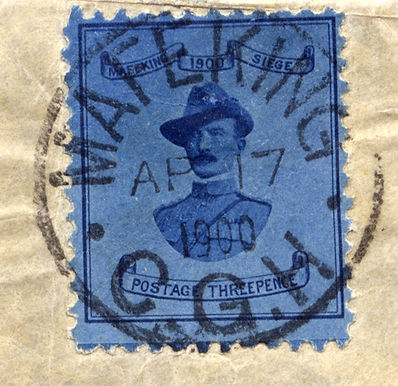
John H
John's current collecting interests include Sheffield postal history (from 1660 to 1900) with a particular focus on the city's metal industries; trans-Atlantic maritime mail in the C19th (from sailing ships to paddle steamers to screw steamers); Southern African territories in the same period (including the Boer War); Parliamentary free postage envelope 'fronts' for local MPs and aristocratic families from 1800 to 1840 (especially the Earls Fitzwilliam and the Dukes of Devonshire, together with their relatives by marriage and nominees for pocket boroughs). He has also built an extensive collection of postage stamps of the USA (with their numerous printing varieties).

A letter sent from Dronfield (near Sheffield) on December 2, 1671, to London, arriving on December 4 (as shown by the Bishop mark in the bottom right corner). The Post Office was established in 1660 by an Act of Parliament after the Restoration of Charles II.
Sheffield was not on a main Post Road and mail from this area was taken to London by ‘common carriers’, driving heavy carts containing a variety of goods. The pre-paid charge per single letter for distances of 81 miles or more was 3d and in good weather the journey took about 3 days.
Henry Bishop was the first franchisee of the Post Office, and he introduced date marks to distinguish pre-paid from unpaid letters arriving in London.
A beautifully-illustrated invoice for steel bars sent in 1846 by a Sheffield manufacturer to their agent in New York on behalf of a customer.
The letter went via Liverpool and Boston and was carried on an early mail steamer. The charge was 1 shilling 'packet rate' from Sheffield to Boston, pre-paid by the sender, and an additional 7 cents domestic charge from Boston to New York City paid by the addressee.


The outer cover of a 'free post' letter sent from Rotherham to London by the 5th Earl Fitzwilliam in October 1833, several months after he succeeded to the title following the death of his father.
He was using the free postage privilege available to Members of Parliament and other Government officials.
The contents have gone, but the addressee, a surgeon called William Barnard Boddy, had advertised ‘cholera drops’ the year before.
A provisional 'emergency' stamp designed and printed by Robert Baden-Powell for use in maintaining a local post service while he and his garrison were trapped in the town of Mafeking by an enemy commando unit in April 1900 during the Second Boer War (South Africa). The stamp features an image of Baden-Powell and was made by a photographic process.
